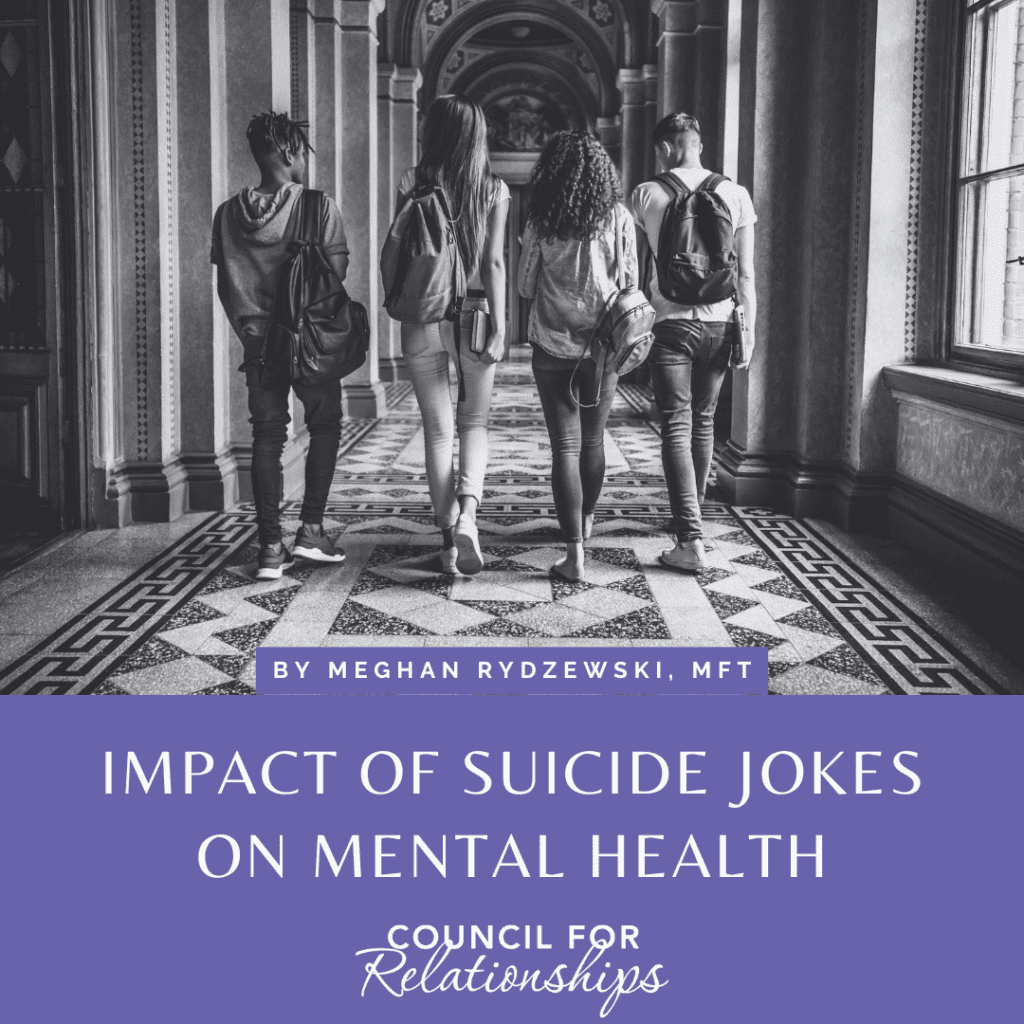Impact of Suicide Jokes on Mental Health: Supporting Peers and Preventing Crisis
The impact of suicide jokes on mental health is a growing concern, particularly among college students adjusting to life on campus. As many freshmen begin their college experience, they face new environments, social pressures, and academic challenges.
These transitions can sometimes feel overwhelming, especially for students who don’t yet have robust support systems in place. Offhand comments like “If I get this professor, I’m gonna jump off a bridge” or “This paper is going to make me kill myself,” while said in jest and to convey a level of frustration, may unintentionally exacerbate feelings of isolation and distress, compounding the challenges students face during these critical years.
According to Marriage and Family Therapist Meghan Rydzewski, maintaining connections with pre-college support networks is crucial during this adjustment period. Recognizing and addressing the impact of suicide jokes on mental health can make a significant difference in fostering healthier, more supportive environments for students.
Read on to learn more about the harmful effects of suicide jokes and how we can all play a part in supporting mental health on college campuses.
The Impact of Suicide Jokes on Mental Health During College Transitions
It is that time of year again—back-to-school time. Many freshmen are attending their chosen colleges for the first time, navigating new environments, and trying to get used to being on campus. Being new to a college can feel lonely, especially if you don’t know many people yet.
If you have friends or classmates who joke about suicide, even if they don’t seem to be struggling with mental health disorders, it’s important to explain why these jokes are dangerous. Many people make casual comments like, “I’d rather kill myself,” when they feel overwhelmed by homework or exams. This harmful language shouldn’t become normalized.
Thousands of people face depression and intrusive thoughts daily. Jokes about suicide downplay their suffering and make it harder for people to open up about their struggles. Addressing this topic with sensitivity helps create a culture where people feel safe to talk about mental health treatment. The impact of suicide jokes on mental health can be far-reaching, even affecting people who don’t have immediate mental health disorders.
Understanding Suicide Risk Among College Students
Nearly 24,000 college students in the United States attempt suicide every year. Of those, 1,100 students die by suicide. According to the National Alliance on Mental Illness (NAMI), staying socially connected helps students remain engaged with peers and activities, which lowers the risk of suicide.
Identifying students who are at risk is vital to getting them help before it becomes a mental health crisis. However, it can be hard to recognize at-risk students when people make jokes about suicide, a behavior that normalizes dangerous thinking and hides genuine distress.
This is especially important for students of color, who face unique challenges on campuses that further complicate their mental health needs. For example, Black, Brown, and other people of color (POC) college students experience higher levels of emotional stress and distress relative to white students and often have greater levels of unmet mental health needs.
The Impact of Suicide Jokes on Mental Health in College
When jokes about suicide are made, they minimize the seriousness of mental health disorders. In the past 12 months, 41% of students reported feeling so depressed that it was hard to function, and 62% experienced overwhelming anxiety. Additionally, one in five college students is estimated to have a substance use disorder. Suicide jokes can cause harm by reducing the urgency of addressing problems like depression, anxiety, or suicidal thoughts.
A robust support system, including friends, staff, and mental health professionals who take suicidal comments seriously, is vital to preventing these harmful effects. In addition to seeking support from peers, students can benefit from engaging in support groups on campus. These groups, often led by trained mental health professionals, provide a safe space for young people to discuss their struggles and receive guidance. For students dealing with a mental health crisis, access to these resources can be life-saving.
How to Help Someone Struggling
If you notice someone showing signs of distress, it’s crucial to provide them with mental health resources or alert a responsible figure, like an RA, who can help. Every college campus should offer 24/7 crisis resources, but if they don’t, call 988, a hotline open 24/7, 365 days a year.
Therapy can also help students manage mental health disorders. Weekly or biweekly therapy can help individuals identify harmful thinking patterns and talk through their feelings. A therapist can also help students address how the impact of suicide jokes on mental health affects their well-being, encouraging them to adopt healthier ways of communicating.
Therapy’s Role in Reducing the Impact of Suicide Jokes on Mental Health
When students engage in therapy, they learn to recognize harmful behaviors, such as making light of mental health challenges. By addressing these behaviors early on, therapy helps reduce the acceptance of dangerous language.
Seeking consistent care can also prevent feelings of isolation and hopelessness, reducing the long-term impact of harmful comments on mental health. For those in need of continuous mental health care, accessing therapy and on-campus mental health resources is key to maintaining well-being.
Conclusion: Changing the Conversation About Suicide Jokes
Suicide is a serious issue that affects thousands of college students every year. By understanding the impact of suicide jokes on mental health, we can create environments where students feel supported and safe.
It is essential to stay connected to the support system you had before going to college until you have built a solid on-campus support network.
Recognizing what you need and asking for help when necessary is crucial. For many students, the transition between going away to college and living on campus can be difficult. Having a support system helps make the transition smoother. Looking out for struggling friends or peers and providing them with resources can also support their well-being.
By taking these steps, you can help protect your mental health and the mental health of others during the difficult transition to college.
If you notice someone making these jokes, take the time to educate them on why it’s harmful. If you or someone you know is struggling, reach out for help. Mental health resources are always available, whether through therapy, campus support, or hotlines like 988.
About Therapist Meghan Rydzewski, MFT
Meghan Rydzewski, MFT, is a Staff Therapist at the Council for Relationships who sees individuals, couples, and families in Philadelphia, Voorhees, NJ, and online. Request an appointment with her today.
Let CFR’s over 85 individual, couples, and family therapy experts help you deal with painful emotions and other mental health conditions. Meghan and her colleagues are well-versed in parenting and child mental health, providing the best care for families in need. See our Therapist & Psychiatrist Directory for CFR therapists or psychiatrists near you.
If this is an emergency, please call 911 or contact the National Suicide Prevention Lifeline by dialing 988.
More Expert Voices: Mental Health Blogs from Council for Relationships
CFR’s therapists, psychiatrists, and mental health experts have much more to share! Check out the CFR Expert Voices blog for helpful advice on topics like navigating mental health symptoms, understanding family dynamics, supporting students’ mental health at colleges and universities, improving relationships, and more. Want to stay updated? Join our mailing list for access to our latest blogs and expert insights!
If you found this blog helpful, explore more great content on the CFR Expert Voices blog.


